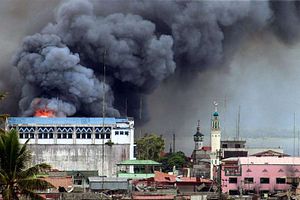This week, the Philippine Senate approved a bill proposed last year and designed to ease legal restrictions on law enforcement officials to facilitate the conviction of suspects. While the legal change is not without controversy, its significance bears noting as it moves closer to reality.
As I have observed previously in these pages, Southeast Asia in general has been concerned about the latest wave of terrorism stemming from the Islamic State and other linked groups over the past few years. The Philippines has been among the countries most affected by this, and concerns remain about the future trajectory of the threat. As these developments have played out, as with other countries, Manila has had to balance how it responds to immediate crises, such as the one in Marawi that struck in 2017, with the longer-term, comprehensive challenges of crafting an overall approach to manage and countering violent extremism.
One of the developments within the Philippines’ counterterrorism approach is a new bill on the issue led by Senator Panfilo Lacson, a former police chief and current chair of the Senate Defense Committee. Senate Bill 1083, which first surfaced late last year, was intended to ease current restrictions on law enforcement officials and facilitate the conviction of suspects under the Human Security Act of 2007 through various means, including a limited, nonextendable detention of suspects without charges and surveillance on suspected terrorists.
Despite suggestions that it could be approved before the end of 2019, did not take place, despite other changes in Philippine policy such as the nonrenewal of martial law in Mindanao. But given sufficient support for the bill in the legislature as well as backing from the defense establishment and executive branch, it seemed that the passage of the bill was only a matter of time and that this would occur sometime in 2020.
This week, the updated anti-terrorism bill was in the headlines again with an approval by the Philippine Senate. Senators approved the law on third and final reading on February 26 following the second reading last week, thereby paving the way for its enacting into law, likely under the previously floated name of the Anti-Terrorism Act of 2020. Per local media reports, the Senate vote was 19-2 in favor of the bill, with the two opposing senators raising concerns about some of the additional allowances given to law enforcement personnel and their negative consequences for rights.
With another step now taken in the approval of the new bill, the focus will shift to how this becomes law and the implications for an amended Human Security Act. And while the wisdom and effectiveness of this legislation can only be fairly assessed once it actually begins to be implemented, this significant move and its ramifications will be closely watched within broader developments in the Philippine security landscape.

































